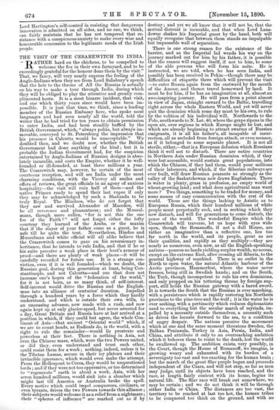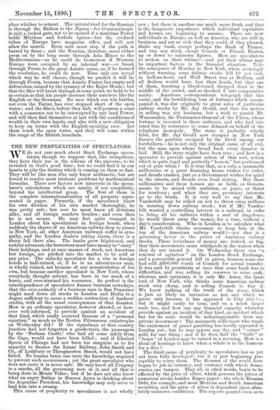THE VISIT OF THE CESA.REWITCH TO INDIA.
" RATHER hard on the chickens, to be compelled to welcome the fox in their own farmyard, and to be exceedingly grateful for the honour done them by the visit." That; we fancy, will very nearly express the feeling of the Anglo-Indians when they see from Lord Salisbury's speech that the heir to the throne of All the Russias is actually on his way to make a tour through India, during which they will be obliged to play the attentive and greatly com- plimented hosts. It is a most bizarre incident, that visit, and one which thirty years since would have been im- possible. It is just that time, we think, since a leading member of the Russian Embassy here, who spoke most languages and had seen nearly all the world, told the writer that he had tried for ten years to obtain permission to enter India, and had been steadily baffled by the British Government, which, " always polite, but always im- movable, conveyed to St. Petersburg the impression that his presence in Calcutta would be unacceptable." We doubted then, and we doubt now, whether the British Government had done anything of the kind ; but it is probable the Indian Government had, for the suspicion entertained by Anglo-Indians of Russian designs is abso- lutely incurable, and costs the Empire, whether it be well- founded or ill-founded, at least three millions a year. The Cesarewitch may, however, be certain of the most courteous reception, and will see India under the most charming conditions, with the Viceroy all smiles and offers of reviews, the great officials in an agony of anxious hospitality—the visit will ruin half of them—and the native Princes ready to spend their last rupee if only they may be acknowledged by such a Shahzada to be truly Royal. The Hindoos, who do not forget that they saw and survived Alexander of Macedon, will be all reverence and pleasantness ; and the Mussul- mans, though more sullen, for is not this the one foe of the Faith ?" will not forget either the lofty courtesy they learned of the Arabs, or the maxim that if the slayer of your father come as a guest, he is safe till he quits the tent. Nevertheless, Hindoo and Mussulman and white official will all alike believe that the Cesarewitch comes to gaze on his reversionary in- heritance, that he intends to rule India, and that if he or his suite perceive a weak place in their host's armour of proof—and there are plenty of weak places—it will be carefully recorded for future use. It is a strange con- viction, even if it is well founded—which we doubt, the Russian goal, during this generation at least, being Con- stantinople, and not Calcutta—and one that does not increase one's hopes of the " federation of the world," for it is not born, as so many think, of self-interest. Self-interest would drive the Russian and the English- man into an alliance of centuries' duration. Impelled through a hundred years by a force which they hardly understand, and which is outside their own wills, to an unceasing advance, now made with a rush, and now again kept up at only glacier-speed, but never arrested for a day, Great Britain and Russia have at last arrived at a position in which, if they could but agree, the whole Con- tinent of Asia—that ancient " Oriental world" which, if we are to count heads, as Radicals do, is the world, with a right to rule the remainder—would lie prostrate and powerless at their feet. There is nothing in Asia, not even the Chinese mass, which, were the two Powers united, or did they. even understand and trust each other, could resist them for a week ; nothing, indeed, unless it be the Tibetan Lamas, secure in their icy plateau and their invincible ignorance, which would even make the attempt. From the Hellespont to Corea, they would be unquestioned lords ; and if they were not too oppressive, or too determined to " regenerate " earth in about a week, Asia, with her seven hundred millions, would sink into a slumber which might last till America or Australia broke the spell. Every motive which could impel conquerors, civilisers, or even tyrants, drives the two Powers towards this alliance ; their subjects would welcome it as a relief from a nightmare ; their " spheres of influence " are marked out as if by destiny ; and yet we all know that it will not be, that the mutual distrust is incurable, and that when Lord Lans- downe shakes his Imperial guest by the hand, both will equally recognise that between them stands an impalpable but impassable wall of separation.
There is one strong reason for the existence of the barrier, and as the Imperial lad wends his way on the journey marked out for him by his father, it is possible that the reason will suggest itself, if not to him, to some of the able persons who will form his suite. He is instructed, we are told, when he has seen India, and possibly has been received in Pekin—though there may be difficulties of etiquette there which will prevent the visit —to enter Russia again from the eastward by the mouth of the Amoor, and thence travel homeward by land. It must be for him, if he has an imagination at all, almost an awe-inspiring journey. He will pass from a point almost in view of Japan, straight onward to the Baltic, travelling right across the whole Eastern World, and yet will never quit the dominion which some day must be his own, to rule by the volition of his individual will. Northwards to the Pole, southwards to N. Lat. 40, where the grape ripens in the open air, over regions in which Europe might be lost, and which are already beginning to attract swarms of Russian emigrants, it is all his father's, all incapable of insur- rection, all as secluded from foreign attack, or even menace, as if it belonged to some separate planet. It is not all sterile, either,—that is a European delusion which Russians think it well not to disturb. There are entire countries in Northern Asia under Russian dominion which, if they were but accessible, would sustain great populations, into which the Chinese, if they had them, would pour millions of their labourers, and which, if the Siberian railways are ever built, will draw Russian peasants as strongly as the valley of the Saskatchewan now draws Englishmen. There is water in plenty, grass in profusion, an empty world of wheat-growing land; and what does agricultural man want more ? Two things, something to be traded for money, and some means of easy communication with the rest of the world. Those are the things lacking to Asiatic as to European Russia, which their hundred millions of white people must perpetually seek, and in seeking which they now disturb, and will for generations to come disturb, the peace of the world. The wonderful Empire which the Cesarewitch will traverse, let us hope with eyes wide open, though the Romanoffs, if not a dull House, are rather an imaginative than a reflective one, lies too far north in the world, and its people, great as are their qualities, and rapidly as they multiply—they are nearly as numerous, even now, as all the English-speaking nations—possess no lands yielding surplus wealth, no access, except on the extreme East, after crossing all Siberia, to the general highway of mankind. There is no outlet in the North to open water, the natural Atlantic harbour of the Arctic provinces, Hammerfest, where the water never freezes, being still in Swedish hands ; and on the South, the Turk, though incompetent to rule his own dominions, and only propped on his tottering throne by foreign sup- port, still holds the Russian gateway with a bared sword. It is towards the South that the Russian is ever marching, with a persistence which is rapidly restoring his Northern provinces to the pine-tree and the wolf ; it is the water he is ever seeking, with a pertinacity which reduces diplomatists used to everything but the secular march of myriads, im- pelled by a necessity outside themselves, a necessity such as drives the locusts forward to the sea, to a condition of angry despair. The nations perceive the movement which at one and the same moment threatens Sweden, the Balkan Peninsula, Turkey in Asia, Persia, India, and China, and attribute it only to an overreaching ambition which it behoves them to resist to the death, lest the world be swallowed up. The ambition exists, very possibly, in the Court, though the House of Romanoff, we imagine, is growing weary and exhausted with its burden of a sovereignty too vast and too exacting for the human brain ; but the march of the great Slav people began and proceeds independent of the Czars, and will not stop, so far as men may judge, until its objects have been reached, and the race, at length fairly content with its home, begins its natural life. The Slav race will break out somewhere, we may be certain ; and we do not think it will be through either India or China. The distances are too vast, the territory to be reached at last too hot, the human tribes to be conquered too thick on the ground, and with no place whither to retreat. The natural road for the Russian is through the Balkan to the /Egean—for Constantinople is only a locked gate, not to be opened if a maritime Power holds Mitylene and forbids egress—but the civilised tribes of Europe have magazine rifles, and will not allow the march. Even ants must stop if the path is barred by flame ; and the Russian, therefore, must either press on by the long route through Asia Minor to the Mediterranean—as he could do to-morrow if Western Europe were occupied by an internal war—or break through Persia to the great Asiatic ocean, as, if he formed the resolution, he could do now. Time only can reveal which way he will choose, though we predict it will lie through Persia, because that Asiatic France lies empty and defenceless, ruined by the tyranny of the Kajar House; but that the Slav will break through at some point, we hold to be as certain as that his people increase their numbers like the English or the Germans. No race which can win battles, not even the Tartar, has ever stopped short of the open water ; and the Slays, before they halt, will possess a coast with a commerce not to be intercepted by any land Power, and will then find themselves at last with the conditions of wealth in their own hands, and also with a new obligation to keep on terms with the English-speaking race. Let them reach the open water, and they will come within the range of the British ironclads.



















































 Previous page
Previous page